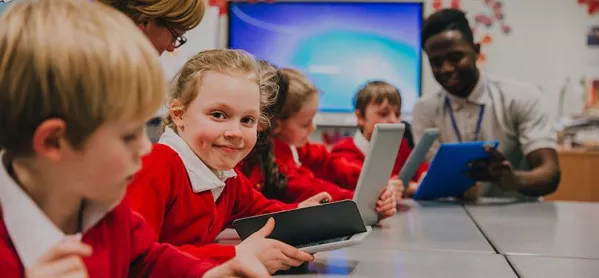
- Home
- Ed tech is so much more than ‘gadgets’
Ed tech is so much more than ‘gadgets’

Earlier this year, Damian Hinds said that he will create “the best generation of teachers yet” by ensuring that teaching remains “an attractive and fulfilling profession”. One of the best ways he can do this? He needs to focus on unnecessary administration and workload. Teachers and schools leaders cite administration as one of the most common reasons for excess workload and the Department for Education (DfE) research has found teachers using days they are not at work “to cover administrative tasks.” The National Audit Office (NAO), too found two-thirds of school leaders identified workload as a key barrier to teacher retention.
The government is committed to using technology to reduce teacher workload. The Conservative Party’s 2017 Manifesto pledged “support for teachers in the preparation of lessons and marking, including through the use of technology, and…bear down on unnecessary paperwork”. The DfE promised to “investigate further how the effective and evidence-based use of technology can be used as a means to remove unnecessary workload.” And in the same speech, the education secretary said that his “goal is to support schools to use technologies in ways that actually reduce the workload burden”.
New research published today by the Reform thinktank is cautiously optimistic that Damian Hinds is on the right track. There is clear evidence that new technology is reducing unnecessary workload and bureaucracy.
Engagement between parents and teachers is crucial but can be time-consuming. The Piota app eases the burden by sending co-ordinated messages to parents and acting as the reference point for school news and events. Using Piota, the Passmores Academy in Essex has eliminated two to three hours of administration per teacher per week.
Homework can also place pressure on teachers’ time. Two-thirds of teachers say the amount of time spent marking reduces their classroom time with pupils. The ‘ShowMyHomework’ app allows teachers to set and mark homework online, with some marking automated. One school using the app has freed up 25 minutes per day for each teacher. Another reports eliminating virtually all of the time that school leaders spend quality assuring homework set by teachers. Apps like these are important given that, according to the OECD, English teachers spend more time than many of their international colleagues on marking and administrative tasks.
As well as reducing unnecessary workload, new technology can also improve pedagogy itself. Data is essential for understanding pupil performance. The twin dangers are that the process of data collection is too burdensome and that teachers don’t have time to analyse the data properly.
Today’s report finds that technology should help in both respects. The report finds that technology is presenting and interpreting data in ways that allow us to understand better the individual needs of pupils. Three-quarters of teachers have agreed that an intelligent use of data has revealed issues in pupil performance of which they were previously unaware. This new information then allows teachers to design to design bespoke, personalised help for pupils.
Technology can also help teachers equip pupils with the skills for the modern workplace. According to the Department for Digital, Culture, Media & Sport, in 20 years, 90 per cent of jobs will entail some element of digital skills. Integrating technology in the classroom supports a range of hard and soft digital skills, such as creativity, innovation and research skills. This will be especially important for disadvantaged children who are less likely to gain these skills outside of the classroom, given limited access to costly devices. It is for this reason that Sir Mark Grundy, executive principal of Shireland Collegiate Academy, told Reform that ed tech can be a “great leveller”.
Some have cast doubt on the immediate potential of ed tech. According to one survey, 44 per cent of teachers had experienced a failure of a piece of technology at some point during the school day. Russell Hobby, the former general secretary of the NAHT headteachers’ union, has previously urged schools to stop spending money on “shiny gadgets”. Even the report’s title, Beyond Gadgets, is designed to shift the focus away from merely getting hardware into schools and on to asking what can be done with them. The approach of the report is to start with the key priorities for pupils and teachers, then set out how technology is positively and constructively transforming education.
Technology should always be a tool rather than an end in itself. There is, however, cause for optimism that ed tech can reduce the workload of teachers and make their work more rewarding.
Daniel El-Gamry is a researcher at Reform
Register with Tes and you can read five free articles every month, plus you'll have access to our range of award-winning newsletters.
Keep reading for just £4.90 per month
You've reached your limit of free articles this month. Subscribe for £4.90 per month for three months and get:
- Unlimited access to all Tes magazine content
- Exclusive subscriber-only stories
- Award-winning email newsletters
You've reached your limit of free articles this month. Subscribe for £4.90 per month for three months and get:
- Unlimited access to all Tes magazine content
- Exclusive subscriber-only stories
- Award-winning email newsletters